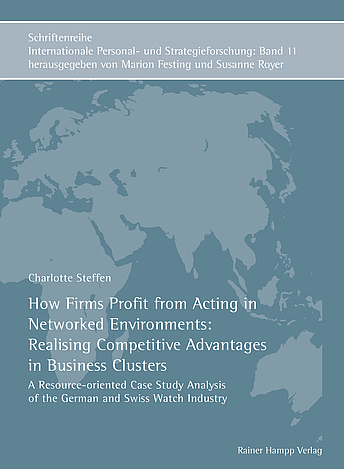Steffen
How Firms Profit from Acting in Networked Environments: Realising Competitive Advantages in Business Clusters
ISBN 978-3-86618-696-5
Over the last years the term 'cluster' has gained widespread interest in theory and praxis. Business clusters seem to be a promising pathway to e.g. strengthening the regional economy, fostering innovations and knowledge exchange as well as safeguarding employment. For these reasons clusters and their development are often financially supported by (regional) governments or the European Union. But not only the overall benefits of acting in networked environments are of interest – the question arises which competitive advantages can be realised by the single firms acting in a cluster. Within this book clusters are seen as value adding webs with the main focus on single firms. Against the background of the German and Swiss watch industry it is analysed how firms profit from being located in a cluster and which competitive advantages can be realised by the firms. To reach this aim a resource-oriented perspective, including the resource based view of the firm as well as the relational view, is chosen as theoretical basis. The main focus is on how the resource endowment of single firms is influenced by the cluster, i.e. by acting in a networked environment in which firms cooperate and compete. In-depth case studies deliver interesting results for practitioners and politicians as well as researchers from different disciplines.
englischOver the last years the term 'cluster' has gained widespread interest in theory and praxis. Business clusters seem to be a promising pathway to e.g. strengthening the regional economy, fostering innovations and knowledge exchange as well as safeguarding employment. For these reasons clusters and their development are often financially supported by (regional) governments or the European Union. But not only the overall benefits of acting in networked environments are of interest – the question arises which competitive advantages can be realised by the single firms acting in a cluster. Within this book clusters are seen as value adding webs with the main focus on single firms. Against the background of the German and Swiss watch industry it is analysed how firms profit from being located in a cluster and which competitive advantages can be realised by the firms. To reach this aim a resource-oriented perspective, including the resource based view of the firm as well as the relational view, is chosen as theoretical basis. The main focus is on how the resource endowment of single firms is influenced by the cluster, i.e. by acting in a networked environment in which firms cooperate and compete. In-depth case studies deliver interesting results for practitioners and politicians as well as researchers from different disciplines.


